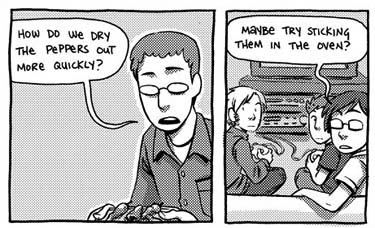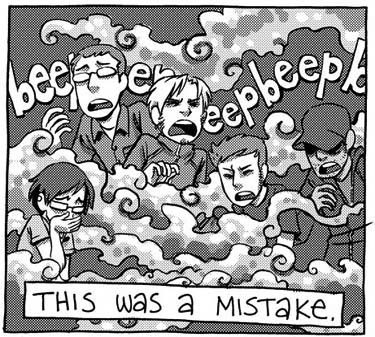 Written by Ananth Panagariya
Written by Ananth Panagariya
Art by Yuko Ota
128 pages, black and white
Self-published
One of my favorite webcomics at the moment is Johnny Wander by Ananth Panagariya and Yuko Ota. It’s a simple enough strip, short one-pagers based on recent events in the life of Panagariya, Ota, and their housemates. When they announced their first print collection of Johnny Wander, though, I jumped at the chance to buy it. By boiling their comic down to singular moments in their life, Johnny Wander is consistently funny and sweet.
 A typical Johnny Wander story is a brief moment in time (although there are exceptions), a conversation or an interaction that Panagariya rewrites into comic book form. And while on the surface it’s a fairly simple thing to do ("take note of something funny that happened in your life"), the reality is that doing it well is not as easy as it looks. Panagariya has a strong sense of comic timing, hitting the punch line or the moment of realization at just the right spot, so that the story flows effortlessly to its conclusion. Sometimes a story can end on a note as simple as a batch of curry being delicious, other times it has the main cast in agony.
A typical Johnny Wander story is a brief moment in time (although there are exceptions), a conversation or an interaction that Panagariya rewrites into comic book form. And while on the surface it’s a fairly simple thing to do ("take note of something funny that happened in your life"), the reality is that doing it well is not as easy as it looks. Panagariya has a strong sense of comic timing, hitting the punch line or the moment of realization at just the right spot, so that the story flows effortlessly to its conclusion. Sometimes a story can end on a note as simple as a batch of curry being delicious, other times it has the main cast in agony.
Perhaps more importantly, there’s always a sense of joy in a Johnny Wander strip, even if it’s one that ends in disaster. I can’t begin to properly stress how important this is; if Johnny Wander took the same stories but made them "woe is me" in terms of mood, it would be an instant turn-off. Panagariya and Ota are able to laugh at themselves (and their friends) in a relaxed, "You’re not going to believe this one" sort of way, and I think that’s what I love the most about Johnny Wander.
 Just as important to Johnny Wander‘s success is Ota’s art, which is both cute and funny, just like Panagariya’s scripts. There are a lot of sharp character designs from Ota, from Panagariya’s hat forever obscuring his eyes, to Ota’s pageboy haircut. How much or little they resemble their real-world selves is unknown to me, but it doesn’t matter; Ota’s taken specific visual hallmarks about themselves and made sure to use them as the focus of their comic book avatars. I also appreciated that Ota uses a black and white palette to its full potential; the shades of gray and usage of zip-a-tone means that her art has a lot of texture and weight to it. The strips in general feel much "larger" on the printed page as well, letting you get a closer look at Ota’s art and letting you fully appreciate the work put into each installment.
Just as important to Johnny Wander‘s success is Ota’s art, which is both cute and funny, just like Panagariya’s scripts. There are a lot of sharp character designs from Ota, from Panagariya’s hat forever obscuring his eyes, to Ota’s pageboy haircut. How much or little they resemble their real-world selves is unknown to me, but it doesn’t matter; Ota’s taken specific visual hallmarks about themselves and made sure to use them as the focus of their comic book avatars. I also appreciated that Ota uses a black and white palette to its full potential; the shades of gray and usage of zip-a-tone means that her art has a lot of texture and weight to it. The strips in general feel much "larger" on the printed page as well, letting you get a closer look at Ota’s art and letting you fully appreciate the work put into each installment.
Johnny Wander Vol. 1: Don’t Burn the House Down is a nice-looking book, with strong production values and slick cover stock. There are a couple of "extras" along the way, like the recipe for Ota’s "dream curry" or some of the winners for a "write your own dialogue for this strip" contest. At the back of the book are some bonus sketches that eventually became full strips, and some commentary to boot. Panagariya and Ota have done an excellent job on this book, but considering how good their work on the strip as well, that’s really not much of a surprise. Check out the webcomic if you haven’t already, and before long you’ll be buying a copy from their online store as well.
